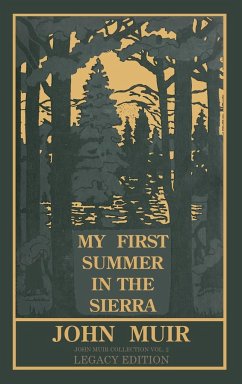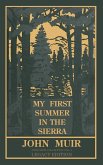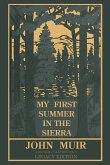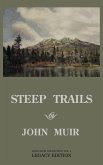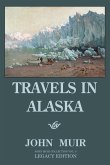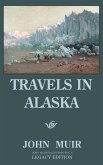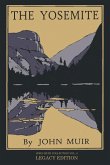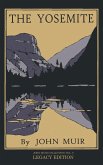See The World Through John Muir's Eyes! This deluxe, unabridged reprint Legacy Edition of John Muir's 1911 My First Summer In The Sierra is a celebration of the beauty of California mountains and the great Yosemite valley. Take a walk with Muir as he explores Yosemite, the Sierras, the land of the large Sequoias, the ancient homes of native peoples, and the forests of America. In this volume, Muir discusses much of what he saw during his travels during his first summer in California's Sierra Range. Reflect on the words of Muir's keen eye for nature and the lore of the woods while you plan your own escape to the wilderness. Muir's admiration of the diversity of his surroundings and appreciation of every living creature big and small is clearly seen in every page! This book makes a perfect gift for backpacking and camping enthusiasts, outsoorspeople, campers, hunters, bushcrafters, scouts, and historians. This book represents the rich history of the American outdoors and camping tradition, and belongs on the bookshelf of every outdoors enthusiast! A part of the Doublebit John Muir Collection: Volume 2 This Doublebit Legacy Edition reprint of My First Summer In The Sierra is professionally restored and presented from the original source with the highest degree of fidelity possible. Available in both paperback and hardcover, readers can enjoy this Legacy Edition for generations and learn from its timeless knowledge for years to come. About the Doublebit Press Library of Legacy Edition Reprints Sometimes we need to remember our history to move forward. Sometimes, remembering our heritage is just fun or inspirational. With technology playing a major role in everyday life, sometimes we need to take a step back in time to find those basic building blocks used for gaining mastery - the things that we have luckily not completely lost and has been recorded in books over the last two centuries. These skills aren't forgotten, they've just been shelved. It's time to unshelve them once again and reclaim the lost knowledge of self-sufficiency! As a part of the Doublebit John Muir Collection, this unabridged Legacy Edition volume is reprinted in the exact form as it was presented in the original publication. Both important and minor details have equally both been accounted for by our publishing staff, down to the cover, font, layout, and images. It is the goal of Doublebit Legacy Edition series to preserve outdoors heritage, but also be cherished as collectible pieces, worthy of collection in any outdoorsperson's library and that can be passed to future generations.

Für die Tasche Wie der Yellowstone-Nationalpark zählt auch das Yosemite Valley in Kalifornien zu den mystisch verehrten Landschaften der USA. Dazu haben viele Menschen beigetragen, auch der Fotograf Ansel Adams, der diese Schönheit der Welt zeigte. Jene Schönheit, die der Umweltaktivist John Muir so beschrieb: Im Merced River "spiegeln sich Maiglöckchen und Bäume und die alles überschauenden Felsen. Zarte und flüchtige Dinge treffen hier auf die Ewigkeit und vermischen sich in unzähligen Formen, und es hat den Eindruck, als hätte Mutter Natur in diesem Bergpalast ihre ausgesuchtesten Schätze versammelt, um ihre Liebhaber zu beeindrucken und in ihren Bann zu ziehen." Yosemite war 1864 eines der ersten Schutzgebiete, noch vor der Gründung des Yellowstone-Nationalparks. Geschützt werden sollte die landschaftliche Schönheit und der touristische Wert. 1903 besuchte Präsident Roosevelt gemeinsam mit John das Gebiet.
1912 schrieb John Muir sein Buch "Yosemite", das nun bei Matthes & Seitz auf Deutsch neu erschienen ist. Es ist eine Lobpreisung des Naturparadieses und eine akkurate Beschreibung der Pflanzen- und Tierarten, der gigantischen Felsen und der Riesenmammutbäume. Es erscheint in der Reihe "Naturkunden" und ist wunderschön aufgemacht. Feines Papier, schöner Druck, ansprechendes Cover. Aber damit wollte man es wohl nicht bewenden lassen und hat einen Coup gelandet: Das Vorwort stammt von Mordecai Ogada. Und das ist ein Problem. Der kenianische Ökologe und Essayist schreibt seit Jahren furios und unversöhnlich gegen den Naturschutzgedanken an. Er sieht darin eine Fortsetzung des Kolonialismus mit anderen Mitteln. Natürlich hat Ogada oft recht. Etwa wenn er schreibt, die Sichtweise europäischer Kolonisten in aller Welt bestimmte, "welcher Teil der Biodiversität getötet und welcher gerettet werden sollte". Die Wünsche der Weißen beeinflussten, "was in der Natur als zu eliminierendes Ungeziefer gilt, was aus Prestigegründen als Trophäe gejagt werden soll und was wertvoll genug ist, um durch den Einsatz von Gewalt geschützt zu werden". All das gilt vor allem für den afrikanischen Kontinent. Dort - aber auch in den USA und im Yosemite - wurden "die Gebiete von Indigenen, die sie einst nutzten, ,gesäubert'".
Doch ein Problem vernachlässigt Oagada: Überall, wo Naturschutz ausgerufen wird, stößt das auf Proteste. Keine Frage, dass man diese heute ernst nehmen muss und Menschen nicht mehr barsch umgesiedelt werden können, um Tiere zu retten. Aber auch in Europa kommt es bei der Ausrufung von Schutzgebieten zu Schwierigkeiten. Als der Nationalpark Berchtesgaden installiert wurde, liefen die Einheimischen Sturm, da sie nun nicht mehr auf den Wegen zum Pilzesammeln gehen konnten, die schon der Großvater ging. Und in der Schweiz gibt es bis heute nur einen einzigen Nationalpark, weil alle anderen Projekte - zuletzt zwei Vorhaben im Tessin - von Anwohnern torpediert wurden. Im Prinzip finden die meisten Menschen Naturschutz gut, aber meist nach dem Nimby-Prinzip. Nationalpark ja, aber "not in my backyard", also nicht bei mir vor dem Haus. Würde man also überall auf die direkten Nachbarn hören - es gäbe nirgends geschützte Gebiete.
Das größte Problem allerdings ist die Konfrontation von Vorwort und Originaltext. Geradeso, als würde Friedrich Merz einleitend zu einer Neuausgabe von Marx' "Das Kapital" schreiben. Ogadas kritischer Text ist für sich genommen lesenswert und regt zum Nachdenken an. Aber warum hat man nicht seinen Essay mit anderen kontroversen Auseinandersetzungen in einen eigenen Band gepackt? So verspürt man nach der Lektüre von Mordecai Ogada keinerlei Lust mehr, John Muirs Buch zu lesen. Und das ist schade. Man verpasst Sätze wie diese: "Die Gipfel der Range sind dann mit glänzenden Fahnen aus wehendem Schnee geschmückt, deren leuchtender Strom manchmal mehr als eine Meile lang ist und die uns mit feierlichem Überschwang zuwinken, als feierten sie ein alle Erwartungen übertreffendes Fest." bfer.
John Muir: "Yosemite". Mit einem Vorwort von Mordecai Ogada. Aus dem Englischen von Jens Lindenlaub und Max Henninger. Matthes & Seitz, Berlin 2021. 200 Seiten, 25 Euro
Alle Rechte vorbehalten. © F.A.Z. GmbH, Frankfurt am Main

